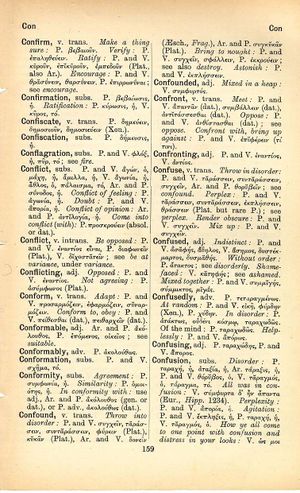confuse: Difference between revisions
From LSJ
Ὁ γράμματ' εἰδὼς καὶ περισσὸν νοῦν ἔχει → Qui litteras didicere, mentis plus habent → Wer schreiben kann, hat auch bedeutenden Verstand
(Woodhouse 2) |
(CSV3) |
||
| Line 1: | Line 1: | ||
{{ | {{Woodhouse1 | ||
| | |Text=[[File:woodhouse_159.jpg|thumb|link={{filepath:woodhouse_159.jpg}}]]'''v. trans.''' | ||
<b class="b2">Throw in disorder</b>: P. and V. ταράσσειν, συνταράσσειν, συγχεῖν, Ar. and P. θορυβεῖν; see [[confound]]. | |||
<b class="b2">Perplex</b>: P. and V. ταράσσειν, συνταράσσειν, [[ἐκπλήσσω|ἐκπλήσσειν]], θράσσειν (Plat. but rare P.); see [[perplex]]. | |||
<b class="b2">Render obscure</b>: P. and V. συγχεῖν. | |||
<b class="b2">Mix up</b>: P. and V. συγχεῖν. | |||
}} | }} | ||
Revision as of 09:25, 21 July 2017
English > Greek (Woodhouse)
v. trans.
Throw in disorder: P. and V. ταράσσειν, συνταράσσειν, συγχεῖν, Ar. and P. θορυβεῖν; see confound.
Perplex: P. and V. ταράσσειν, συνταράσσειν, ἐκπλήσσειν, θράσσειν (Plat. but rare P.); see perplex.
Render obscure: P. and V. συγχεῖν.
Mix up: P. and V. συγχεῖν.

